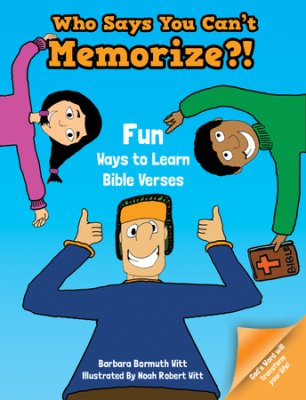Who Says You Can’t Memorize?! Fun Ways to Learn Bible Verses should help learners of all ages come up with methods for memorizing Bible verses that work for them. Author Barbara Bormuth Witt draws from concepts based on learning modalities and multiple intelligences to offer techniques that suit visual, kinesthetic, and auditory learners as well as those who learn best through art, music, drama, crafts, and even the use of color. It has playful elements that might appeal to those who have found other Scripture memory programs daunting.
This 32-page book provides complete outlines with details for some effective memorization techniques. For example, “Act It Out” walks you through the steps for coming up with body movements to go with a verse, including the possibility of using American Sign Language. The colorful illustrations are easy to follow. The book uses one Bible verse for each of these detailed outlines. When you purchase it from www.LordsPress.com, it comes with a list of suggested Bible verses to memorize. This book teaches you the methods, but you can choose which verses to memorize.
“Techno Tips” scattered through the book offer suggestions using technology that might enhance memorization. For example, one suggestion says, “Have your device notify you frequently with your verse. Every time the verse pops up, repeat it out loud” (p.6). Another tip suggests creating a password from the first letter of each word of your verse. Obviously, this one works best for shorter verses.
The strategies for memorization on page 19 and “More Great Memory Ideas" on pages 23 and 24 should be helpful. I personally like the “Keep the Numbers Fun” idea on page 24: “Remember chapter and verse numbers by thinking of them as a time of day or a math problem.”
Page 27 lists helpful internet sites such as www.Freescripturesonsgs.org and www.Biblebee.org that have Bible verse songs. The next page lists Bible clubs and their websites. It also lists some websites and apps that offer memory tools; these are either free, or they offer a free trial. In addition, pages 29 and 30 have “Tips for Special Needs.”
You might have heard of some of the ideas in this book already, but whether or not the ideas are new to you, it should be helpful to have them in one place to remind you to experiment with different methods, especially for those who struggle with Scripture memorization.









